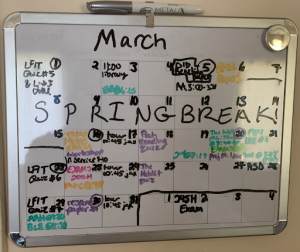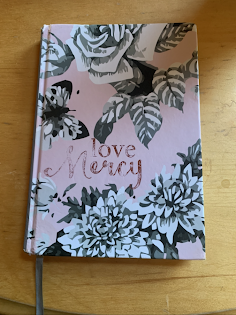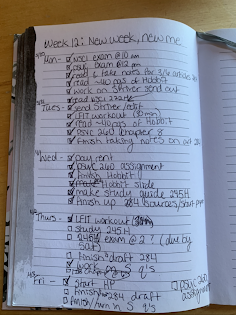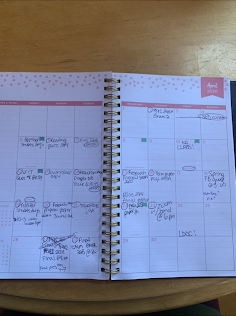My Many Methods of Organization
By a fellow UNC student
When I first came to college, I found it challenging to balance various elements of my life. From class assignments and club meetings to my work schedule and meet ups with friends, it didn’t take long before I started feeling very overwhelmed. I started thinking: How am I supposed to stay on top of all of these deadlines? How can I figure out when I’ll have time to fit everything in my schedule? Eventually I developed a three-part system to keep myself organized.
1. Planner/Calendar

The beginning of a new school year sparks my excitement for picking out a fresh calendar. I usually find a cheap planner with a monthly calendar view at Walmart to start the year off right. Whenever I get a new syllabus during FWOC, I take some time over the weekend to write in all of my major assignment due dates for the entire semester. However, sometimes due dates change (as I have seen this semester due to the impact of COVID-19), so using whiteout, an eraser, or even just a pen (like I normally do) helps me make those changes. My planner gives me an overview of my entire academic semester and helps me coordinate times for club meetings and my work schedule. However, some of my jobs and clubs use Google Calendar to mark their events for the month, so using a combination of handwritten and digital calendars is helpful for me.
2. Visual Reminders

In addition to my planner, I also have a dry-erase calendar that hangs beside my desk in my room. Here, I love color coding assignments to my classes because it looks visually appealing, and I can see how much time I need to dedicate to one particular class for the week. Having a visual calendar that I look at everyday keeps me up to date with approaching exams and papers, so they don’t accidentally slip my mind. When a new month approaches, I erase my calendar and put in the new dates by referencing my planner. These two resources work together to provide me with a big picture for the whole semester and a monthly view, but there’s still one more piece to my system that helps me on a day-to-day basis.
3. Notebook/Checklist

Perhaps my favorite part of my little system is my notebook. When I had eighteen credit hours in a semester, I felt like I was drowning in assignments. I was having such a difficult time remembering when all of my homework was due and when I would actually have time to complete it. Since both my planner and my dry-erase calendar weren’t physically big enough for me to include all of these weekly assignments, I decided to use one of the blank notebooks tucked away on my bookshelf. Starting out as a basic list of things that needed to be done for the week, my system has now evolved into a series of checklists, each separated by day with the entire week on one page. I eventually added my own personal touches to keep me motivated and engaged. For example, all of my weeks have names, including the most recent, “New week, new me,” which was my attempt to add some motivation to the new online class format.

Typically, I try to make my checklists at the start of the week (Monday) and divide assignments evenly throughout the rest of the week. For example, if I have to finish a book by Friday, I’ll divide the number of pages I need to read by the number of days I have to read so that I don’t wind up procrastinating. Although this process takes me a little extra time to set up, it saves me from future stress and allows me to use my time much more efficiently. Once I check off a box in the checklist, I feel so accomplished (especially when I’m ahead of schedule). This sense of accomplishment provides me with my own personal incentive to stay on task for the week.
The biggest takeaway I’ve had while reflecting on the development of my personal method of organization is that I need to stay in tune with myself. As I’ve moved through different stages of involvement within my academic, social, and work life, I recognize what areas need to be improved and what strategies I can try to manage them. For me currently, as a college student, my multi-step system is perfect for me, but ultimately there is no magic solution. At the end of the day, I just do what I can to keep myself organized, focused, and motivated.
This blog showcases the perspectives of UNC Chapel Hill community members learning and writing online. If you want to talk to a Writing and Learning Center coach about implementing strategies described in the blog, make an appointment with a writing coach or an academic coach today. Have an idea for a blog post about how you are learning and writing remotely? Contact us here.


